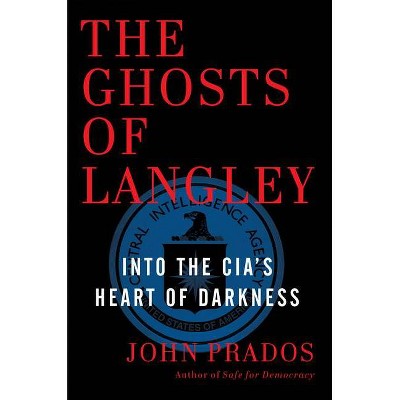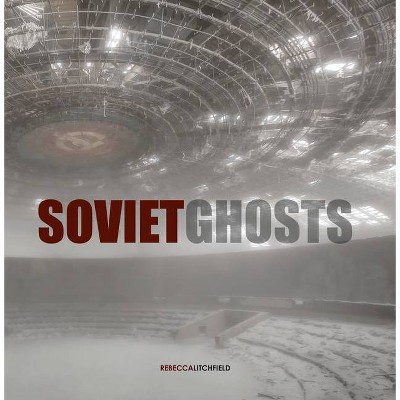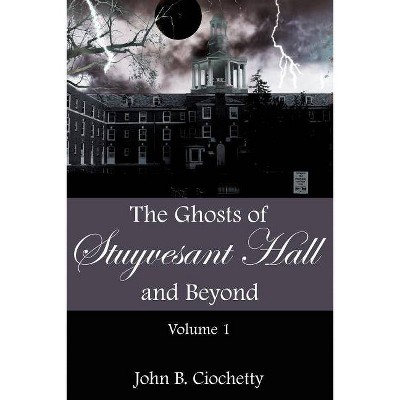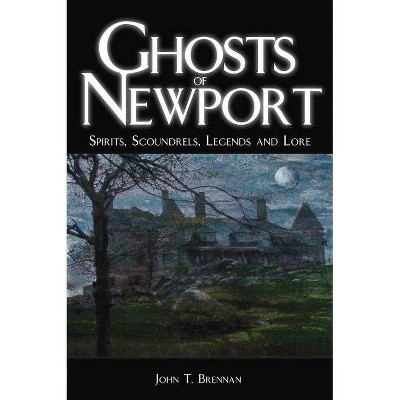The Ghosts of Langley - by John Prados (Hardcover)

Similar Products
Products of same category from the store
AllProduct info
<p/><br></br><p><b> About the Book </b></p></br></br>From the writer Kai Bird calls a "wonderfully accessible historian," the first major history of the CIA in a decade, published to tie in with the seventieth anniversary of the agency's founding<p/><br></br><p><b> Book Synopsis </b></p></br></br><b><i>The Ghosts of Langley</i> offers a detail-rich, often relentless litany of CIA scandals and mini-scandals. . . [and a] prayer that the CIA learn from and publicly admit its mistakes, rather than perpetuate them in an atmosphere of denial and impunity.<br><strong>--<em>The Washington Post</em></strong> <p/>From the writer Kai Bird calls a wonderfully accessible historian, the first major history of the CIA in a decade, published to tie in with the seventieth anniversary of the agency's founding<br></b><br>During his first visit to Langley, the CIA's Virginia headquarters, President Donald Trump told those gathered, I am so behind you . . . there's nobody I respect more, hinting that he was going to put more CIA operations officers into the field so the CIA could smite its enemies ever more forcefully. But while Trump was making these promises, behind the scenes the CIA was still reeling from blowback from the very tactics that Trump touted--including secret overseas prisons and torture--that it had resorted to a decade earlier during President George W. Bush's war on terror. Under the latest regime it seemed that the CIA was doomed to repeat its past failures rather than put its house in order. </p> <em>The Ghosts of Langley</em> is a provocative and panoramic new history of the Central Intelligence Agency that relates the agency's current predicament to its founding and earlier years, telling the story of the agency through the eyes of key figures in CIA history, including some of its most troubling covert actions around the world. It reveals how the agency, over seven decades, has resisted government accountability, going rogue in a series of highly questionable ventures that reach their apotheosis with the secret overseas prisons and torture programs of the war on terror.</p> Drawing on mountains of newly declassified documents, the celebrated historian of national intelligence John Prados throws fresh light on classic agency operations from Poland to Hungary, from Indonesia to Iran-Contra, and from the Bay of Pigs to Guantánamo Bay. The halls of Langley, Prados persuasively argues, echo with the footsteps of past spymasters, to the extent that it resembles a haunted house. Indeed, every day that the militarization of the CIA increases, the agency drifts further away from classic arts of espionage and intelligence analysis--and its original mission, while pushing dangerously beyond accountability.</p> <em>The Ghosts of Langley</em> will be essential reading for anyone who cares about the next phase of American history--and the CIA's evolution--as its past informs its future and a president of impulsive character prods the agency toward new scandals and failures.<p/><br></br><p><b> Review Quotes </b></p></br></br><br><strong>Praise for <i>Ghosts of Langley</i>: </strong><br><i>The Ghosts of Langley</i> offers a detail-rich, often relentless litany of CIA scandals and mini-scandals. . . [and a] prayer that the CIA learn from and publicly admit its mistakes, rather than perpetuate them in an atmosphere of denial and impunity.<br><strong>--<em>The Washington Post</em></strong> <p/>Prados admirably aims to highlight positive moments in agency history, but a primary motivation is to document the means spies have employed to 'escape from criticism and accountability' . . . . The American intelligence establishment's yearning to outdo its rivals, both foreign and domestic, has produced a mixture of both genuine and comic-opera horrors that make for entertaining, if dismaying, accounts such as this one.<br><strong>--<em>Publishers Weekly</em></strong> <p/>"A riveting highlight reel of the CIA's greatest hits--and misses--over seven decades. Prados proves again that he is among America's greatest chroniclers of secret intelligence."<br>--<strong>Tim Weiner, author of<em> Legacy of Ashes: The History of the CIA</em> and <em>Enemies: A History of the FBI</em></strong> <p/>John Prados, who knows more than anyone else about the CIA, has written a book that summarizes four decades of his research and relates a tale that is always gripping, often dismaying, frequently infuriating, and suddenly more timely than ever.<br><strong>--H.W. Brands, Jack S. Blanton Sr. Chair in History at the University of Texas at Austin, Pulitzer Prize nominee, and <em>New York Times</em> bestselling author of <em>The First American: The Life and Times of Benjamin Franklin</em> and <em>The General vs. the President: MacArthur and Truman at the Brink of Nuclear War</em></strong> <p/>'Know thy enemy' is a mantra in the world of intelligence--which is why every CIA officer should read John Prados. <em>The Ghosts of Langley</em> is a relentless portrait of the Agency, crafted with vivid stories about its zealots, its ignored heroes and celebrated schemers. Prados has been writing about intelligence for three decades and now synthesizes his knowledge into a history not to be ignored.<br><strong>--Kai Bird, Pulitzer Prize-winning biographer and executive director of the Leon Levy Center for Biography at CUNY Graduate Center in New York City</strong> <p/>John Prados is a one-man truth commission who wants to know three things--what the United States really wanted, really feared and really did in the world since the birth of the CIA in 1947. His latest book, <em>The Ghosts of Langley</em>, offers a deep look into that history. His purpose is not to attack or to defend but to confront what we know--and what we know, in Prados's telling, is plenty.<br><strong>--Thomas Powers, author of <em>The Man Who Kept Secrets: Richard Helms and the CIA</em> and <em>The Killing of Crazy Horse</em></strong> <p/>Writing with characteristic verve and passion and exploiting his unsurpassed expertise, John Prados has produced an account of the CIA's origin, evolution, and behavior certain to engage and inform scholars, practitioners, and general readers. By focusing on individuals--the 'great, the good, and the misguided, ' he brings the agency's checkered history to life and ties it inextricably to the present.<br><strong>--Richard Immerman, professor and Marvin Wachman Director Emeritus, Center for the Study of Force and Diplomacy, Temple University, and former assistant deputy director of National Intelligence for Analytic Integrity and Standards and Analytic Ombudsman for the Office of the Director of National Intelligence</strong><br><br><p/><br></br><p><b> About the Author </b></p></br></br><strong>John Prados</strong> is a senior fellow of the National Security Archive, where he directs the CIA Documentation Project and the Vietnam Documentation Project and helps in other areas. He writes books on aspects of intelligence, diplomatic, military and national security. His works include <em>Storm Over Leyte: The Philippine Invasion and the Destruction of the Japanese Navy</em>, <em>Normandy Crucible</em>, and <em>Islands of Destiny: The Solomons Campaign and the Eclipse of the Rising Sun</em>. His books on the CIA--some of which have been on CIA recommended reading lists--include <em>The Ghosts of Langley: Into the CIA's Heart of Darkness</em> (The New Press), <em>Safe for Democracy</em>, <em>The Family Jewels</em>, <em>William Colby and the CIA</em>, <em>Presidents' Secret Wars</em>, and <em>The Soviet Estimate</em>. He has consulted on historical aspects of film projects and his papers, articles, and reviews have appeared widely. Prados also designs board strategy games.
Price History
Cheapest price in the interval: 13.99 on October 22, 2021
Most expensive price in the interval: 13.99 on December 20, 2021
Price Archive shows prices from various stores, lets you see history and find the cheapest. There is no actual sale on the website. For all support, inquiry and suggestion messagescommunication@pricearchive.us




















